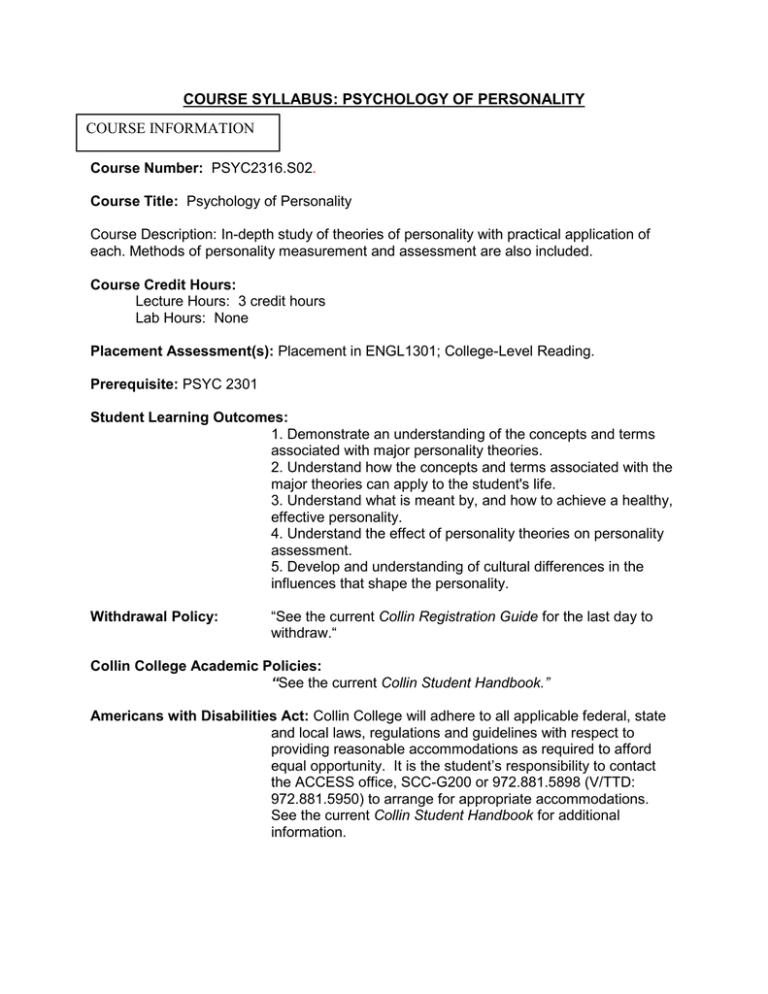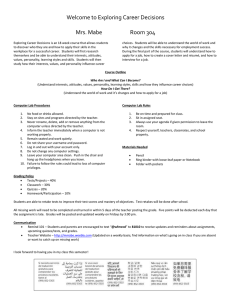course syllabus: psychology of personality
advertisement

COURSE SYLLABUS: PSYCHOLOGY OF PERSONALITY COURSE INFORMATION Course Number: PSYC2316.S02. Course Title: Psychology of Personality Course Description: In-depth study of theories of personality with practical application of each. Methods of personality measurement and assessment are also included. Course Credit Hours: Lecture Hours: 3 credit hours Lab Hours: None Placement Assessment(s): Placement in ENGL1301; College-Level Reading. Prerequisite: PSYC 2301 Student Learning Outcomes: 1. Demonstrate an understanding of the concepts and terms associated with major personality theories. 2. Understand how the concepts and terms associated with the major theories can apply to the student's life. 3. Understand what is meant by, and how to achieve a healthy, effective personality. 4. Understand the effect of personality theories on personality assessment. 5. Develop and understanding of cultural differences in the influences that shape the personality. Withdrawal Policy: “See the current Collin Registration Guide for the last day to withdraw.“ Collin College Academic Policies: “See the current Collin Student Handbook.” Americans with Disabilities Act: Collin College will adhere to all applicable federal, state and local laws, regulations and guidelines with respect to providing reasonable accommodations as required to afford equal opportunity. It is the student’s responsibility to contact the ACCESS office, SCC-G200 or 972.881.5898 (V/TTD: 972.881.5950) to arrange for appropriate accommodations. See the current Collin Student Handbook for additional information. INSTRUCTOR INFORMATION Instructor’s Name: Patricia Prewitt Coble Office Number: Spring Creek Campus, Room K237 Office Hours: By appointment: Tues/Thurs 11:30- 1:30 Phone Number: 972-881-5759 Email: pcoble@collin.edu (best method) Class Information: Psyc 2316 Section Number: S02 Meeting Times: Tuesdays and Thursdays, 10:00 am – 11:15 am Meeting Location: Collin College, Spring Creek Campus, Room I 229 Course Resources: Textbook: Olson, M. & Hergenhahn, B (2011). An Introduction to Theories of Personality, 8th ed, Prentice-Hall. A copy of this text is placed on “reserve” in the library. Supplies: Course textbook, student ID, library card, scantron forms, folder for portfolio, sharpened pencils, paper. Attendance Policy: Students are expected to attend each class session. The last day to withdraw and receive the grade of "W" is March 9, 2012. Students who decide to not complete the course are responsible for officially withdrawing themselves from the course; failure to do so will result in a performance grade of "F". Additional Student Learning Outcomes: TBD. Method of Evaluation: Class Attendance and Participation (approximately 16% of final grade): Weekly in class documented activities are completed and reviewed and are to be organized into a “participation portfolio” that will be turned in (use folder) at the end of the semester. While many of these activities will start in class, they may need to be completed as homework. In addition there will be some on-line activities that require access to a computer. The total number of points you can earn is 100. Exams and Quizzes (approximately 68% of final grade): There will be 3 major exams worth up to 100 pts. each. Grand total points on all exams are 300 pts. Exams consist of multiplechoice questions and short answer questions. Make up exams are offered on the day of the final exam immediately after completing exam 3. Other times for approved make up exams are at the discretion of the instructor. There will be a minimum of 5 quasi- ‘pop’ quizzes covering previously studied concepts and vocabulary. These will be short, short answer quizzes. Total points for all quizzes will be 100 pts. Your Personal Theory of Personality Semester Project (approximately 16% of final grade): This semester long project explores personal insights and issues in personality development and connecting personal views of human nature and differences to different personality theories. Project instructions are provided in writing on a separate form and will also be available on line at our instructional web site or via Blackboard. Alternative Assessments: Your final course grade may increase up to one letter grade based on successfully completed alternative assessment opportunities (extra credit) to be announced in class during the semester. Grading (points available): EXAMS and QUIZZES Total: Exam #1 Exam #2 Exam #3 Quizzes (5) 400 100 100 100 100 PARTICIPATION PORTFOLIO Total: PROJECT Total: Alternative Assessment 100 100 60 A = 540 pts and over B = 480 - 539 pts C = 420 - 479 pts D = 360 - 419 pts F = 359 < pts Academic Ethics: Every member of the Collin College community is expected to maintain the highest standards of academic integrity. Collin College may initiate disciplinary proceedings against a student accused of scholastic dishonesty. Scholastic dishonesty includes, but is not limited to, statements, acts, or omissions related to applications for enrollment or the award of a degree, and/or the submission of one’s own work material that is not one’s own. Scholastic dishonesty may involve, but is not limited to, one or more of the following acts: cheating, plagiarism, collusion, use of annotated texts or teacher’s editions, use of information about exams posted on the Internet or electronic medium, and/or falsifying academic records. While specific examples are listed below, this is not an exhaustive list and scholastic dishonesty may encompass other conduct, including any conduct through electronic or computerized means: Plagiarism is the use of an author's words or ideas as if they were one's own without giving credit to the source, including, but not limited to, failure to acknowledge a direct quotation. Cheating is the willful giving or receiving of information in an unauthorized manner during an examination, illicitly obtaining examination questions in advance, copying computer or Internet files, using someone else's work for assignments as if it were one's own, or any other dishonest means of attempting to fulfill the requirements of a course. Collusion is intentionally aiding or attempting to aid another in an act of scholastic dishonesty, including but not limited to providing a paper or project to another student, providing an inappropriate level of assistance; communicating answers to a classmate during an examination; removing tests or answer sheets from a test site, and allowing a classmate to copy answers. See the current Collin Student Handbook for additional information. Note: At a minimum, the consequence of academic dishonesty will result in a “zero” grade on the particular assignment or test. A report is filed with the Dean of Students if further investigation is needed. Frequently asked Questions: Can electronic devices be used in the classroom? Electronic devices may be used in the classroom to enhance learning of the day’s psychology topic. If you plan to use electronic devices in the classroom you will be assigned to seating that will complement the use of the device for you as well as minimize distraction to others. Playing games, text messaging, listening to music, using cell phones, etc would not be considered as appropriate use of an electronic device in a learning environment. Please turn off the audio features of these devices before you enter the classroom. Violation of appropriate use of devices will immediately disallow your use of them in this class for the rest of the semester. How do you handle disruptive students? The classroom is a scholarly environment and students are expected to behave accordingly. Expression of ideas, thoughts, opinions, etc. is encouraged, but has to be done in a respectful manner. Students who express willful disrespect towards their classmates or the instructor may be asked to leave the classroom. Do I have to type my work? Semester project, reaction papers, extra credit reports are all required to be ‘typed’. Typed papers should be double spaced, one inch margins, 12 pt times roman font. What if I have to leave class early? If you must leave class early, please let me know before class starts. Also sit close to the door so that you do not disrupt class (or me) when you leave. Thank you for your respect! Course Content and Calendar: Date Lecture/ DiscussionTopic Jan 17 Course Introduction Defining Dimensions of Personality Theoretical Issues Jan 19 Jan 24 Jan 26 Jan 31 Feb 2 Feb 7 Feb 9 Feb 14 Feb 16 Feb 21 Feb 23 The Psychoanalytic View Sigmund Freud The Psychoanalytic View Sigmund Freud 2 Exploring biographies The Psychoanalytic View Carl Jung The Psychoanalytic View Carl Jung 3 Sociocultural View Alfred Adler Sociocultural View Alfred Adler 4 Sociocultural View Karen Horney Sociocultural View Karen Horney 5 Sociocultural View Erik Erikson Sociocultural View Erik Erikson 6 2 Myers-Briggs Type Indicator Mar 29 Experiential exercise 4 Experiential exercise 5 The Trait View R.B. Cattell & Hans J. Eysenck The Trait View Personality Tests Mar 27 Word Association Test 3 Mar 6 Mar 22 I am … A Personal Personality Theory Exam 1 The Trait View Gordon Allport Mar 20 Portfolio and Project Activities 1 1 Feb 28 Mar 1 Mar 8 RequiredCha pter 6 Ego Identify Status 7 Experiential exercise 8 8 Spring Break 9 The Learning View B.F. Skinner The Learning View Dollard and Miller NEO-PIR Personality Inventory Experiential exercise 10 The Learning View Bandura and Mischel The Learning View Key Contributions 11 Self- Efficacy Scale 9,10,11 April 3 April 5 Exam 2 The Evolutionary Paradigm David M. Buss April 10 12 Experiential exercise The Existential-Humanistic View George Kelly* The Existential-Humanistic View George Kelly* 13 Personal Constructs The Existential-Humanistic View Carl Rogers The Existential-Humanistic View Carl Rogers 14 April 24 April 26 The Existential-Humanistic View Abraham Maslow The Existential-Humanistic View Abraham Maslow 15 15 May 1 May 3 Other views of Personality Summing Up and Future Directions 16* opt 17 May 8 Exam 3 (Finals Week) April 12 April 17 April 19 / Tuesday 10:00 to 12:00 13 Life-Script 14 Self Actualization Your Theory of Personality Due


